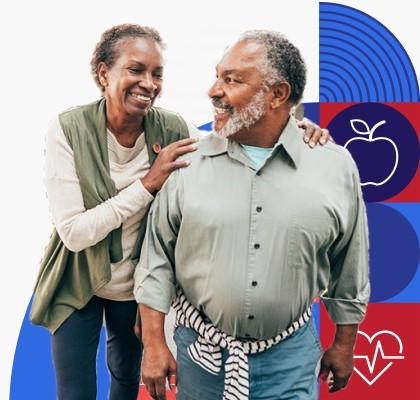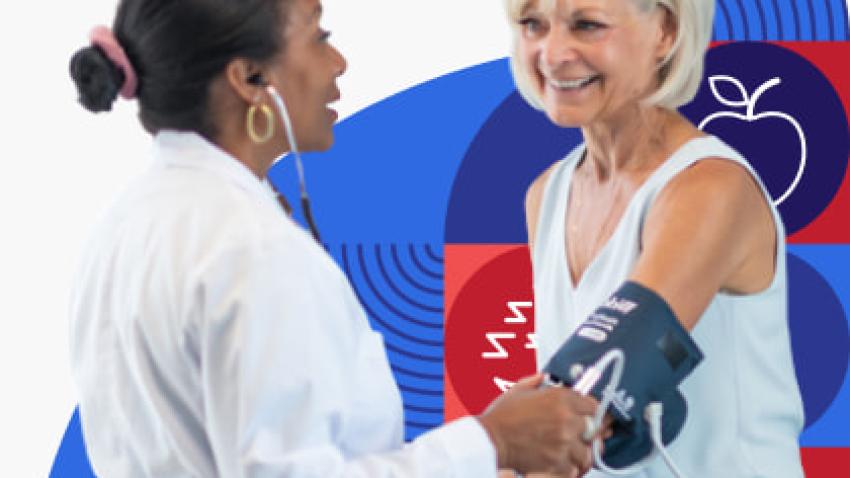Health Conditions
Lower Your Risk of Stroke

The Basics
Overview
You can help lower your risk of stroke by making healthy changes.
These are the most important steps you can take to lower your risk of stroke:
- Keep your blood pressure and cholesterol levels in the normal range
- If you smoke, quit
- Keep your blood sugar (glucose) in the normal range
- If you have heart disease, get treatment
- Stay at a healthy weight
- Get active
- Eat healthy
Taking these steps can also help lower your risk of heart disease and diabetes.
Learn more about healthy habits that can help prevent stroke:
Am I at Risk?
Am I at risk for stroke?
The number 1 risk factor for stroke that you can affect is high blood pressure. High blood pressure often has no signs or symptoms, so it's important to get your blood pressure checked by a doctor or nurse regularly. You can also check your blood pressure yourself at home.
Ask your doctor how often you need to get your blood pressure checked.
You may also be at higher risk for stroke if you:
- Have had a previous stroke or a transient ischemic attack (also called a TIA or mini-stroke)
- Smoke products that have nicotine in them
- Drink too much alcohol
- Use certain drugs (like cocaine or heroin)
- Have diabetes
- Don’t get enough physical activity
- Are overweight or have obesity
- Have certain heart problems, like coronary artery disease (heart disease), an irregular heartbeat (including atrial fibrillation), or problems with a heart valve
- Have high cholesterol
You’re at higher risk of having a stroke as you get older. You may also be more at risk if someone in your family has had a stroke. Make sure you know your family’s medical history and share it with your doctor.
Definition
What is a stroke?
The most common type of stroke happens when blood flow to part of the brain is blocked, which can damage or kill cells in the brain.
Stroke is a leading cause of death and long-term disability in adults. It can also cause brain damage.
A stroke can cause long-term problems like:
- Memory problems or trouble thinking and speaking
- Vision problems
- Trouble walking or keeping your balance
- Paralysis (not being able to move some parts of the body) and muscle weakness
- Trouble controlling or expressing emotions
- Trouble with chewing and swallowing
- Trouble controlling when you go to the bathroom
Signs
What are the signs of a stroke?
A stroke usually happens suddenly. But it can also happen over hours or even days. Signs of a stroke include:
- Sudden dizziness, loss of balance, or trouble walking
- Sudden confusion, trouble speaking, or trouble understanding what people are saying
- Sudden trouble seeing in 1 or both eyes
- Sudden numbness or weakness of the face, arm, or leg — especially on 1 side of the body
- Sudden, severe headache with no known cause
Having a stroke is a medical emergency. Call 911 right away if you or someone else shows signs of stroke.
The acronym FAST can help you remember the most common signs of a stroke and what to do if you think you or someone else is having a stroke:
- F (face drooping)
- A (arm weakness)
- S (speech trouble)
- T (time to call 911)
Your chances of surviving and recovering from a stroke are better if you get emergency treatment right away.
What is a mini-stroke?
A mini-stroke causes the same symptoms as a stroke, but the symptoms don't last as long. A mini-stroke is also called a TIA, which stands for transient ischemic attack.
A TIA happens when blood flow to the brain is blocked for a short period of time — usually minutes to hours. If you’ve had a TIA, you are at higher risk for having a larger stroke.
Never ignore signs of a TIA. Call 911 right away if you or someone else is showing signs of a mini-stroke.
Take Action
Know Your Numbers
Take these steps today to lower your risk of stroke.
Get your blood pressure checked.
High blood pressure is the most important risk factor for stroke, so it's important to get your blood pressure checked by a doctor or nurse starting at age 18 years. You can also check your own blood pressure at home.
If your blood pressure is high, talk with your doctor or nurse about how to lower it.
Learn more about getting your blood pressure checked.
Get your cholesterol checked.
Having high cholesterol can raise your risk of stroke. If you’re age 18 years or older, it’s important to get your cholesterol checked at least every 4 to 6 years. Some people will need to get it checked more often.
If your cholesterol is high, talk with your doctor about steps you can take to lower it.
Healthy Habits
Quit smoking.
Quitting smoking is one of the best things you can do to prevent stroke. After you quit smoking, your risk of stroke and heart disease starts to go down. Use these tips to quit smoking.
Get active.
Getting active can help lower your risk of stroke. Aim for:
- At least 150 minutes every week of moderate aerobic activity — try walking fast or biking
- Muscle-strengthening activities 2 days a week — try lifting weights or doing push-ups
Learn how to get more physical activity.
If that’s more activity than you can do right now, do what you can. Even 5 minutes of physical activity has real health benefits. You can use this tool to build a personalized weekly activity plan.
Get enough sleep.
Sleep is important for staying healthy. Make sure you get enough sleep, and get treatment for any sleep problems you have. For example, sleep apnea is a sleep disorder that causes people’s breathing to pause during sleep and increases the risk of stroke.
Check out our tips for getting the sleep you need. Talk with your doctor if you have trouble getting enough sleep.
Food and Alcohol
Eat healthy.
Eating healthy can help keep your blood pressure and cholesterol under control. Aim to fill half your plate with fruits and vegetables at meals, and try to cut down on foods high in sodium (salt) and saturated fat. These resources can help:
Drink alcohol only in moderation.
Drinking too much alcohol can raise your risk of high blood pressure, which is a major cause of stroke. If you choose to drink alcohol, drink only in moderation. That means:
- 1 drink or less in a day for women
- 2 drinks or less in a day for men
Find tips for drinking in moderation.
Take steps to prevent type 2 diabetes.
Diabetes can raise your risk of stroke. Eating healthy and staying active can lower your risk of diabetes. Learn more about preventing type 2 diabetes.
If you have diabetes, talk with your doctor or nurse about ways to keep your blood sugar (glucose) in the normal range.
Talk with Your Doctor
Ask your doctor about taking aspirin every day.
Aspirin can lower your risk of heart attack and stroke by preventing blood clots. Clots are clumps of thickened blood that can block blood flow.
Taking aspirin regularly is not recommended for everyone. Talk with your doctor to find out if taking aspirin is the right choice for you.
Know your family’s health history.
Your family’s health history can give your doctor or nurse important information about your risk for stroke. Use this family health history tool to keep track of your family’s health, and share the information with your doctor or nurse.
Content last updated May 23, 2024
Reviewer Information
This information on preventing stroke is adapted from materials from the National Institute of Neurological Disorders and Stroke and the National Heart, Lung and Blood Institute.
Reviewed by:
Howard Tracer, MD
Associate Scientific Director, USPSTF Division
Center for Evidence and Practice Improvement
Agency for Healthcare Research and Quality (AHRQ)


